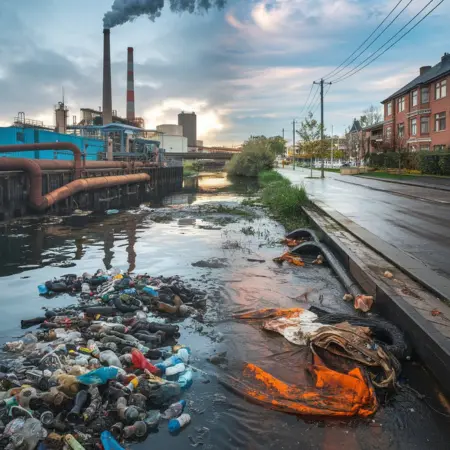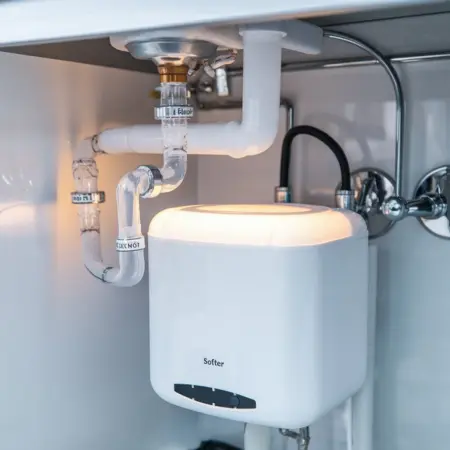Water is life, but not all water is safe to use.
Many things, like pollution, chemicals, weather, and other factors affecting water quality, can impact its quality.
This guide explores the key factors that impact water and why they matter.
Dive in to keep our water clean and safe!
Key Takeaways
- Water quality is affected by both nature and human activities.
- Groundwater often has more minerals than surface water.
- Weather events like heavy rain and lack of rain can harm water quality.
- Natural pollutants like arsenic and radon can affect water safety.
- Industrial waste and urban runoff can pollute water sources.
- Agricultural chemicals, like pesticides, can wash into rivers and lakes.
- Old pipes can leak harmful materials into drinking water.
- Proper plumbing maintenance helps prevent pollution.
- Household activities, like using chemicals, can pollute water.
- Regular water testing and pollution control are essential for safe water.
Natural Factors Affecting Water Quality
Water quality is not just about pollution; nature also plays a role.
Factors like the water’s origin and natural minerals can change its quality.
Understanding these helps protect and use water wisely.
1. Geographic Location And Source
Where water comes from affects its quality.
Groundwater comes from deep underground and often has more minerals.
Surface water, like rivers and lakes, is open to the environment and can get dirty easily.
The type of rocks in an area can also add minerals to the water.
2. Weather And Climate Conditions
Weather changes affect water quality.
Heavy rains wash dirt and debris into lakes and rivers, making the water dirty.
Floods can mix harmful things into water.
Droughts make water levels drop, and the remaining water can have more pollutants.

3. Natural Contaminants (Pollutant)
Some harmful things are natural.
Arsenic and radon, toxic elements, come from rocks into groundwater.
Metals like iron and manganese can also mix with water.
Small amounts are usually safe, but too much can be harmful.
Human Activities And Their Impact
Human activities greatly affect water quality.
Cities, farms, and old water systems can add harmful substances to water.
Understanding these issues helps us protect our water sources.
1. Urban Development And Industrial Waste
Cities and factories can harm water quality.
Factories release waste into rivers, lakes, or the air, which can mix with water.
In cities, rain washes oil, trash, and chemicals from streets into water sources.
When people don’t properly dispose of waste, it adds to the pollution problem.
2. Agricultural Practices
Farming can pollute water in several ways.
Farmers use pesticides, weed killers, and fertilizers to grow crops.
These chemicals can wash into rivers and lakes when it rains.
Animal farms also cause problems.
It can flow into nearby water bodies.
This spreads harmful bacteria and nutrients that harm water quality.
3. Infrastructure (Structure) And Water Systems
Old water pipes and systems can make water unsafe.
Pipes may rust and leak harmful materials, like lead, into the water.
Some areas don’t have proper systems to clean water.
Water treatment plants help reduce these risks but need regular maintenance.

Household And Personal Factors
What you do at home can affect water quality.
Old pipes and household activities can pollute water.
Taking care of plumbing and using eco-friendly practices helps keep water safe.
1. Plumbing Materials And Maintenance
The materials used in home plumbing can affect water safety.
Old pipes made of lead can release harmful particles into drinking water.
Outdated plumbing systems might also leak and cause pollution.
Regular maintenance, like checking and replacing pipes, helps keep water clean and safe.
2. Household Activities
What we do at home can impact water quality.
Strong cleaning products and pouring chemicals down the drain can pollute water systems.
Proper waste disposal and choosing eco-friendly products can help.
Conserving water, like fixing leaks and using less, reduces pressure on water systems.
This helps keep water supplies cleaner.
Solutions And Preventative Measures
There are many ways to keep water clean and safe.
Testing water, reducing pollution, and improving household practices can make a big difference.
These simple steps help protect water for everyone.

1. Monitoring And Testing Water Quality
Testing water regularly is important to ensure its safety.
Homes and businesses should check their water often for harmful chemicals or bacteria.
Tools and services are available to help test water.
These tests show whether the water is clean and something is wrong.
2. Protecting Natural Water Sources
To keep water clean, we need to reduce pollution.
We can do this by using fewer chemicals and properly throwing away trash.
Taking care of rivers, lakes, and other natural water sources is also important.
Supporting laws and policies that protect water helps keep it clean for everyone.
3. Improving Household Water Safety
You can install filters and softeners to make water safer at home.
These remove harmful substances and improve water quality.
It’s also important to teach your family how to protect water.
Simple actions, like not pouring chemicals down the drain, can help keep water safe.
Conclusion
This article discusses the key factors that affect water quality.
It is affected by many factors, like pollution and weather.
Both individual and community efforts are needed to protect and improve water.
Test your water regularly and take steps to keep it safe for everyone.
Every action counts in maintaining clean water. Contact us at OP Plumbing Hub for expert advice.
